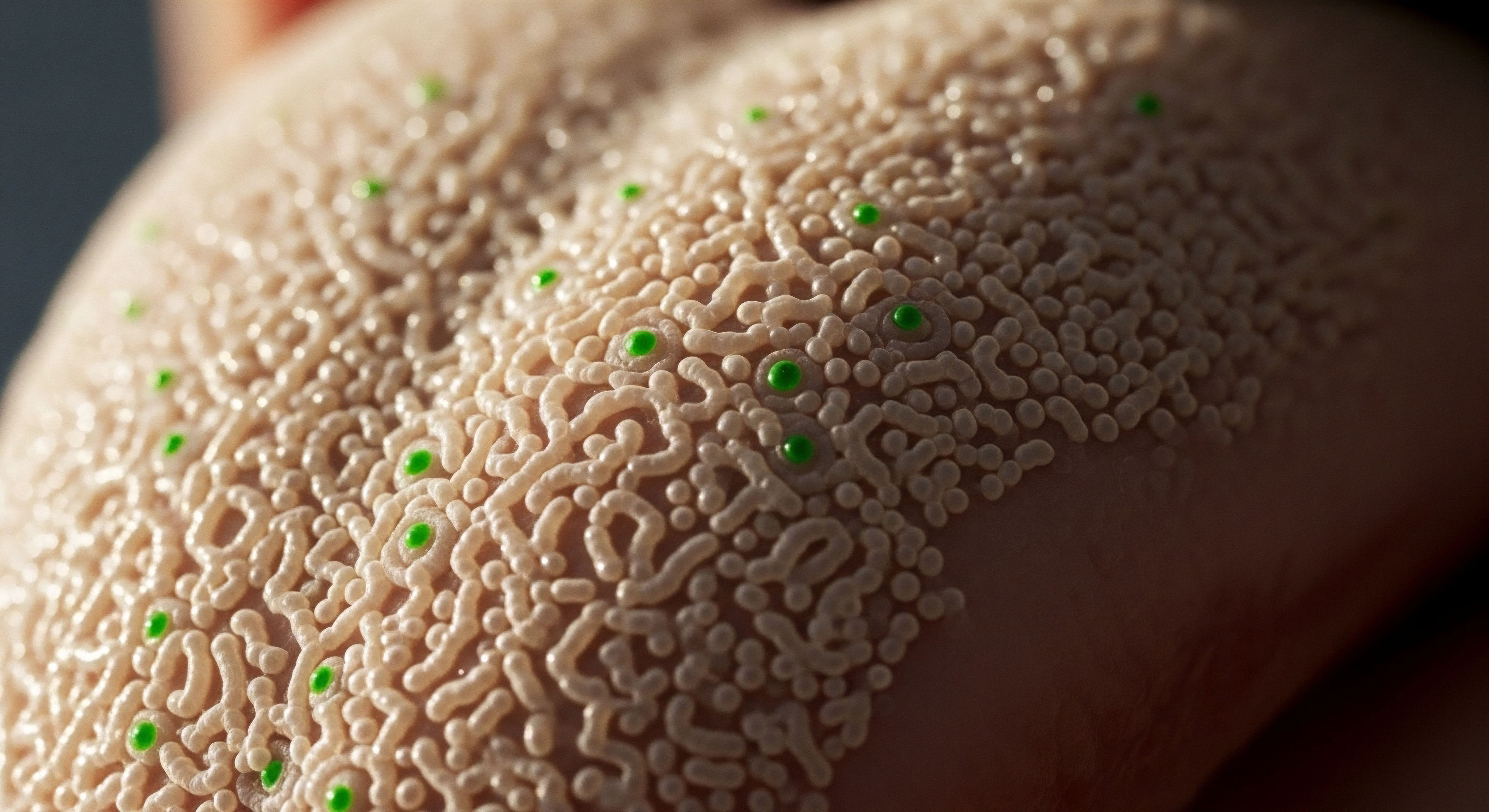

Fundamentals
Many individuals experience a subtle yet persistent erosion of mental acuity, emotional equilibrium, and fundamental vitality. This experience often manifests as an inexplicable fatigue, a persistent mental fog, or a diminished capacity for joy, leaving one feeling disconnected from their inherent potential.
You may recognize these sensations, understanding that they represent more than fleeting moments of stress; they signal a deeper dysregulation within the body’s intricate communication networks. When considering advanced biochemical recalibration, such as peptide therapy for mental wellness, recognizing the profound influence of your daily habits becomes paramount.
Peptides, these remarkably precise chains of amino acids, function as sophisticated messengers within the biological system, orchestrating a myriad of physiological responses. They can modulate neurotransmitter activity, influence neuroinflammation, and support neuroplasticity, thereby offering a targeted approach to mental health challenges. However, the efficacy of these targeted interventions does not exist in isolation.
The body’s internal environment, meticulously shaped by lifestyle choices, serves as the fundamental substrate upon which these peptides operate. Consider your body as a finely tuned orchestra; peptides are specific soloists, yet their performance is entirely dependent on the harmonious backdrop provided by the entire ensemble of your biological systems.
Optimizing lifestyle factors establishes a receptive internal environment, significantly enhancing the therapeutic impact of peptide interventions for mental wellness.

The Endocrine System and Mental Architecture
The endocrine system, a sprawling network of glands and hormones, exerts a profound influence over mental architecture. Hormones such as cortisol, thyroid hormones, and sex steroids directly impact mood, cognition, and stress resilience. A dysregulated endocrine landscape can create a suboptimal milieu for brain function, manifesting as anxiety, depression, or cognitive decline.
Peptide therapies, in their various forms, often interact with or support components of this endocrine symphony. For instance, growth hormone-releasing peptides can influence sleep architecture, which in turn profoundly impacts hormonal balance and neurocognitive function.
Understanding your unique biological blueprint involves recognizing how sleep, nutrition, physical movement, and stress management collectively influence these hormonal cascades. These lifestyle elements are not merely supportive adjuncts; they represent the foundational pillars that either amplify or diminish the body’s inherent capacity for self-regulation and therapeutic response. A sustained lack of restorative sleep, for example, can elevate inflammatory markers and disrupt the delicate rhythm of cortisol secretion, creating an uphill battle for any peptide aiming to restore neurochemical harmony.

How Lifestyle Conducts Your Internal Symphony?
Your daily choices function as the conductor of your internal biochemical symphony. Each decision regarding diet, movement, and rest sends signals throughout your system, influencing gene expression, cellular repair, and the intricate dance of neurotransmitters. For those seeking to optimize mental wellness through peptide therapy, this understanding provides a powerful framework for personal agency. The body’s capacity to synthesize, utilize, and respond to both endogenous and exogenous peptides is profoundly shaped by the metabolic and inflammatory state induced by lifestyle.
- Sleep Optimization ∞ Adequate, restorative sleep directly influences growth hormone secretion, critical for neurogenesis and repair, making peptides like Sermorelin or Ipamorelin more effective.
- Nutritional Precision ∞ A nutrient-dense diet supports neurotransmitter precursors and reduces systemic inflammation, creating a more favorable environment for neuro-modulating peptides.
- Stress Mitigation ∞ Chronic stress dysregulates the HPA axis, increasing cortisol and impacting brain health; practices reducing stress enhance the brain’s receptivity to therapeutic peptides.


Intermediate
For individuals already familiar with the foundational principles of hormonal health, the deeper mechanisms by which lifestyle factors modulate peptide therapy become increasingly compelling. The interaction is far from passive; instead, it represents a dynamic feedback loop where optimized daily practices prime the biological system for a more robust and sustained therapeutic response.
Consider the intricate dance between growth hormone secretagogues and sleep architecture. Peptides such as Sermorelin and Ipamorelin work by stimulating the natural release of growth hormone from the pituitary gland. This endogenous growth hormone secretion is most pronounced during deep sleep cycles.
Consequently, if sleep quality is compromised, the very biological window for these peptides to exert their maximal effect is diminished. This illustrates a profound principle ∞ the body’s inherent rhythms and capacities must be respected and supported for advanced protocols to yield their intended benefits. The goal extends beyond simply administering a peptide; it involves creating an internal landscape where that peptide can operate with maximal efficiency, influencing cellular repair, metabolic balance, and ultimately, neurocognitive function.
Lifestyle choices serve as critical co-factors, directly influencing the bioavailability, receptor sensitivity, and downstream signaling pathways of therapeutic peptides.

Nutritional Bioregulation of Peptide Efficacy
Nutritional bioregulation plays a central role in supporting peptide therapy for mental wellness. The availability of specific micronutrients and macronutrients directly influences neurotransmitter synthesis, mitochondrial function, and the integrity of neuronal membranes. For instance, peptides designed to support cognitive function or mood stabilization, such as those impacting dopamine or serotonin pathways, rely on the body’s capacity to synthesize these crucial neurochemicals. This process, in turn, demands adequate intake of amino acid precursors, B vitamins, and essential fatty acids.
A diet rich in processed foods, conversely, can induce systemic inflammation and dysbiosis within the gut microbiome. The gut-brain axis represents a critical communication highway, and an inflamed gut can propagate neuroinflammation, creating a less responsive environment for peptides targeting central nervous system pathways. A targeted nutritional strategy, emphasizing whole, unprocessed foods, healthy fats, and adequate protein, therefore, functions as a powerful synergistic element, optimizing the metabolic backdrop for peptide action.

Targeted Nutritional Strategies
- Protein Adequacy ∞ Ensures a steady supply of amino acid building blocks for both endogenous peptides and neurotransmitters.
- Healthy Fats ∞ Supports neuronal membrane fluidity and reduces inflammation, vital for optimal brain function and peptide signaling.
- Micronutrient Density ∞ Provides co-factors for enzymatic reactions involved in peptide metabolism and neurotransmitter synthesis.

Stress Adaptation and Hormonal Recalibration
Chronic psychological or physiological stress exerts a pervasive influence on the endocrine system, primarily through the sustained activation of the hypothalamic-pituitary-adrenal (HPA) axis. Elevated cortisol levels can lead to hippocampal atrophy, impaired neurogenesis, and altered neurotransmitter sensitivity, all of which directly impede mental wellness. Peptides designed to mitigate stress responses or support neuroprotection will encounter significant resistance in an environment dominated by chronic HPA axis dysregulation.
Effective stress adaptation protocols, including mindfulness practices, targeted supplementation, and appropriate physical activity, facilitate a recalibration of the HPA axis. This recalibration creates a more balanced hormonal milieu, enhancing the brain’s receptivity to the therapeutic signals conveyed by peptides. For example, Pentadeca Arginate (PDA), a peptide known for its tissue repair and anti-inflammatory properties, can contribute to systemic resilience, yet its full restorative potential is magnified when the body is not simultaneously battling overwhelming stress-induced inflammation.
Integrating stress reduction techniques alongside peptide therapy creates a powerful synergy, promoting a state of neuroendocrine balance conducive to lasting mental wellness.
| Lifestyle Factor | Mechanism of Influence | Peptide Therapy Synergy |
|---|---|---|
| Sleep Quality | Regulates endogenous hormone release (e.g. Growth Hormone), supports cellular repair, modulates neuroinflammation. | Enhances efficacy of growth hormone secretagogues (Sermorelin, Ipamorelin) and neuro-restorative peptides. |
| Nutritional Density | Provides precursors for neurotransmitters, reduces systemic inflammation, supports mitochondrial function. | Optimizes metabolic environment for all peptides, particularly those targeting cognitive function and mood. |
| Stress Management | Recalibrates HPA axis, lowers cortisol, reduces neuroinflammation, preserves neuronal integrity. | Increases brain receptivity to neuroprotective and mood-modulating peptides. |


Academic
The academic exploration of lifestyle factors supporting peptide therapy for mental wellness necessitates a deep dive into the intricate crosstalk between the neuroendocrine-immune axes and their modulation by environmental cues. We consider the brain as a highly plastic organ, constantly adapting its structural and functional architecture in response to both endogenous signals and exogenous stimuli.
Peptide therapeutics, in this context, function as sophisticated modulators of these adaptive processes, yet their ultimate success is inextricably linked to the underlying biological terrain. The concept of allostatic load, representing the cumulative physiological cost of chronic stress, offers a robust framework for understanding how persistent lifestyle dysregulation can impede therapeutic outcomes.
The focus here centers on the neuroinflammatory landscape and its profound implications for mental health and peptide responsiveness. Chronic, low-grade systemic inflammation, often driven by dietary patterns, gut dysbiosis, and inadequate sleep, readily translates into neuroinflammation. Microglial activation, a hallmark of neuroinflammation, can disrupt synaptic plasticity, impair neurogenesis, and alter neurotransmitter metabolism, creating a state of neuronal vulnerability.
Peptides such as Tesamorelin, a growth hormone-releasing factor, and PDA, with its tissue repair properties, can exert anti-inflammatory effects, yet their capacity to quell a raging neuroinflammatory storm is significantly limited without concurrent lifestyle interventions that address the root causes of inflammation.
Neuroinflammation, driven by lifestyle imbalances, represents a significant barrier to the optimal function of peptide therapeutics targeting mental wellness.

Mitochondrial Biogenesis and Peptide Action
Mitochondrial biogenesis, the process by which new mitochondria are formed, represents a critical nexus where lifestyle and peptide therapy converge for mental wellness. Neurons, being highly metabolically active cells, depend profoundly on robust mitochondrial function for ATP production, calcium homeostasis, and the synthesis of neurotransmitters.
Lifestyle factors, particularly regular physical activity and nutrient-dense nutrition, are potent stimulators of mitochondrial biogenesis. Exercise, for instance, activates peroxisome proliferator-activated receptor gamma coactivator 1-alpha (PGC-1α), a master regulator of mitochondrial biogenesis and function.
Peptides such as MK-677, a growth hormone secretagogue, can indirectly support mitochondrial health through their effects on growth hormone and IGF-1, which are known to influence cellular metabolism. However, the synergistic effect is magnified when lifestyle actively promotes mitochondrial resilience.
A diet rich in antioxidants and polyphenols, for example, protects mitochondria from oxidative damage, ensuring their optimal function and enhancing the cellular environment for peptide action. The interplay here is hierarchical ∞ lifestyle establishes the fundamental metabolic capacity, upon which peptides can then exert their more refined modulatory effects.

Interplay of Metabolic Health and Neuroplasticity
Metabolic health, profoundly shaped by diet and activity, directly underpins neuroplasticity, the brain’s ability to reorganize itself by forming new synaptic connections. Insulin resistance, a common metabolic dysregulation, can impair glucose uptake in the brain, leading to energy deficits that compromise neuronal function and plasticity.
This metabolic impairment creates a less fertile ground for peptides aimed at enhancing cognitive function or mood. For example, while PT-141 primarily targets melanocortin receptors for sexual health, its broader influence on neuroendocrine pathways suggests that optimal metabolic health would enhance its overall systemic reception and potential for indirect neurocognitive benefits.
The judicious integration of time-restricted feeding or specific macronutrient ratios can significantly improve insulin sensitivity and metabolic flexibility. These adaptations create a more stable energy supply for the brain, reducing excitotoxicity and promoting an environment conducive to neuroplastic repair and growth. The profound connection between peripheral metabolic status and central nervous system function underscores the necessity of a holistic approach, where peptide therapy is viewed as an advanced intervention within a meticulously constructed framework of metabolic health.
| Lifestyle Factor | Biological Pathway Influenced | Implication for Peptide Therapy |
|---|---|---|
| Circadian Rhythm Entrainment | Melatonin-cortisol rhythm, HPA axis regulation, sleep-wake cycle. | Optimizes timing and efficacy of growth hormone-releasing peptides; improves neuroendocrine balance. |
| Gut Microbiome Diversity | Short-chain fatty acid production, neurotransmitter synthesis (e.g. serotonin), immune modulation. | Reduces neuroinflammation, enhances gut-brain axis integrity, improves peptide absorption and systemic response. |
| Aerobic Exercise | BDNF production, mitochondrial biogenesis, cerebral blood flow, anti-inflammatory cytokine release. | Increases neuroplasticity, creates a more receptive brain environment for neurotrophic and cognitive-enhancing peptides. |

Genetic Predisposition and Personalized Protocols
Understanding genetic predispositions provides a layer of personalization for lifestyle protocols supporting peptide therapy. Polymorphisms in genes related to neurotransmitter metabolism, detoxification pathways, or inflammatory responses can influence an individual’s unique response to both environmental stressors and therapeutic interventions. For example, variations in catechol-O-methyltransferase (COMT) can affect dopamine metabolism, impacting mood and stress resilience. In such cases, lifestyle interventions might be tailored to support specific enzymatic pathways, creating a more favorable biochemical landscape for peptides targeting dopaminergic systems.
The academic pursuit here moves beyond generalized recommendations to a precision approach, where genomic insights inform dietary choices, exercise prescriptions, and stress management techniques. This personalized framework ensures that lifestyle modifications are not merely generic health advice but are specifically designed to address an individual’s unique vulnerabilities and strengths, thereby maximizing the therapeutic potential of peptide protocols. This confluence of advanced biochemical interventions and deeply personalized lifestyle strategies represents the zenith of integrative wellness.

References
- Dattilo, M. & Ferraris, C. (2018). The Importance of Sleep in the Endocrine System and Metabolism. Journal of Clinical Endocrinology & Metabolism, 103(9), 3217-3224.
- Cryan, J. F. & Dinan, T. G. (2012). Mind-altering microorganisms ∞ the impact of the gut microbiota on brain and behavior. Nature Reviews Neuroscience, 13(10), 701-712.
- Herman, J. P. & Cullinan, W. E. (1997). Neurocircuitry of stress ∞ central control of the hypothalamo-pituitary-adrenocortical axis. Trends in Neurosciences, 20(2), 78-84.
- Lopez-Otín, C. Blasco, M. A. Partridge, L. Serrano, M. & Kroemer, G. (2013). The hallmarks of aging. Cell, 153(6), 1194-1217.
- Petersen, M. C. & Shulman, G. I. (2018). Mechanisms of Insulin Action and Insulin Resistance. Physiological Reviews, 98(4), 2133-2223.
- Snyder, L. R. (2019). Growth Hormone ∞ Mechanisms and Clinical Implications. Springer.
- Wallace, D. C. (2012). Mitochondria and cancer ∞ Warburg effect revisited. Seminars in Cell & Developmental Biology, 23(1), 130-142.
- Yuen, K. C. J. & Biller, B. M. K. (2019). Growth Hormone Deficiency in Adults ∞ A Practical Guide. Humana Press.

Reflection
The journey toward reclaiming mental wellness, particularly when augmented by sophisticated tools like peptide therapy, is profoundly personal. The insights gleaned from exploring the intricate connections between your lifestyle and your biological systems serve as more than mere information; they represent a compass for self-discovery.
This knowledge empowers you to understand your unique physiology, recognizing that true vitality arises from a harmonious relationship between external practices and internal biochemical realities. Your path to optimal function and enduring well-being is an ongoing dialogue with your own body, a continuous process of observation, adaptation, and intentional self-care.

Glossary

peptide therapy

mental wellness

neuroinflammation

neuroplasticity

lifestyle choices

endocrine system

sleep architecture

peptide therapies

growth hormone

systemic inflammation

nutrient-dense diet

chronic stress

hpa axis

lifestyle factors

hormonal health

growth hormone secretagogues

supporting peptide therapy

cognitive function

gut microbiome

stress adaptation

mitochondrial biogenesis




